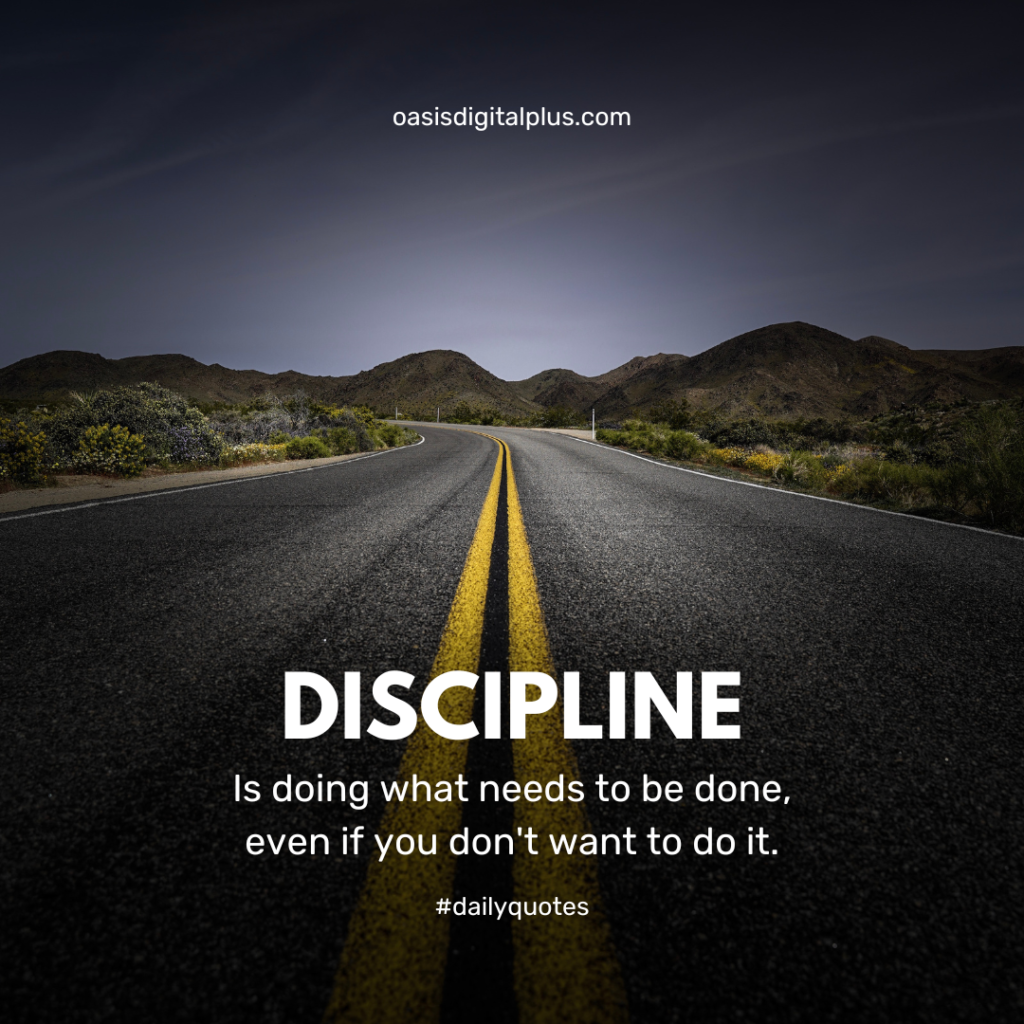Address
304 North Cardinal
St. Dorchester Center, MA 02124
Work Hours
Monday to Friday: 7AM - 7PM
Weekend: 10AM - 5PM
Address
304 North Cardinal
St. Dorchester Center, MA 02124
Work Hours
Monday to Friday: 7AM - 7PM
Weekend: 10AM - 5PM


Self-discipline is the cornerstone of achievement, serving as the driving force behind personal growth, productivity, and success. It encompasses the ability to control impulses, stay focused on long-term goals, and consistently take action toward desired outcomes, even in the face of challenges or distractions. In this extensive exploration, we delve into the essence of self-discipline, its importance in various aspects of life, and practical strategies for cultivating and strengthening this invaluable trait.
Understanding Self-Discipline: Self-discipline is the ability to regulate one’s thoughts, emotions, and behaviors in alignment with long-term goals and values. It involves making conscious choices and taking deliberate actions that serve one’s best interests, even when faced with temptations, obstacles, or discomfort. Self-discipline empowers individuals to overcome procrastination, resist instant gratification, and pursue meaningful objectives with determination and perseverance.
Key Components of Self-Discipline:
Clarity of Purpose: Self-discipline begins with clarity of purpose – a clear understanding of what you want to achieve and why it matters to you. Define your goals, values, and priorities with precision, and remind yourself regularly of the reasons behind your actions to stay motivated and focused.
Commitment to Excellence: Self-discipline entails a commitment to excellence and continuous improvement in all areas of life. Set high standards for yourself, strive for excellence in your endeavors, and refuse to settle for mediocrity. Embrace challenges as opportunities for growth and development, and approach each task with a mindset of mastery and refinement.
Emotional Regulation: Self-discipline requires emotional intelligence and self-awareness to manage impulses, urges, and negative emotions effectively. Learn to recognize triggers that lead to procrastination or distraction, and develop healthy coping mechanisms to respond to stress, frustration, or temptation in constructive ways.
Consistent Action: Consistency is the hallmark of self-discipline. Cultivate habits, routines, and rituals that support your goals and reinforce positive behaviors. Prioritize daily actions that contribute to your long-term success, and commit to following through on your commitments, even when motivation wanes or obstacles arise.
The Importance of Self-Discipline:
Achieving Goals: Self-discipline is essential for setting and achieving goals in any area of life – whether it’s advancing in your career, improving your health and fitness, or mastering a new skill. Without self-discipline, goals remain mere aspirations, lacking the follow-through and persistence needed for success.
Boosting Productivity: Self-discipline is a catalyst for productivity, enabling individuals to prioritize tasks, manage time effectively, and maintain focus on high-impact activities. By overcoming procrastination and avoiding distractions, disciplined individuals can accomplish more in less time and achieve greater results.
Building Resilience: Self-discipline cultivates resilience – the ability to bounce back from setbacks, failures, and challenges with strength and determination. By developing resilience, individuals can navigate adversity with grace, learn from setbacks, and emerge stronger and more resilient in the face of future obstacles.
Enhancing Well-Being: Self-discipline contributes to overall well-being by promoting healthy habits, routines, and lifestyle choices. Whether it’s maintaining a balanced diet, exercising regularly, getting enough sleep, or managing stress effectively, disciplined individuals prioritize self-care and invest in behaviors that nourish their physical, mental, and emotional health.
Strategies for Cultivating Self-Discipline:
Set Clear Goals: Define clear, specific, and achievable goals that align with your values and aspirations. Break down larger goals into smaller, actionable steps, and create a roadmap for success with deadlines and milestones to track progress.
Create Daily Habits: Establish daily habits and routines that support your goals and reinforce positive behaviors. Start small and gradually build momentum over time, focusing on consistency and progress rather than perfection.
Practice Mindfulness: Cultivate mindfulness and present awareness to observe your thoughts, emotions, and impulses without judgment or attachment. Mindfulness helps develop self-control, impulse regulation, and conscious decision-making, enabling you to act in alignment with your values and goals.
Develop Willpower: Strengthen your willpower muscle through deliberate practice and discipline. Set challenges or goals that require self-control and discipline to achieve, and gradually increase the difficulty over time to build resilience and mental toughness.
Stay Accountable: Find an accountability partner, coach, or support group to hold you accountable to your commitments and provide encouragement and feedback along the way. Share your goals and progress publicly to create social pressure and motivation to follow through on your intentions.
Self-discipline is not a trait bestowed upon a select few but a skill that can be cultivated and strengthened through deliberate practice and commitment. By embracing the principles and strategies outlined in this guide, you can harness the power of self-discipline to achieve your goals, unlock your full potential, and lead a purpose-driven life of success and fulfillment. Remember that self-discipline is not a destination but a journey – a lifelong pursuit of growth, mastery, and excellence. Embrace the process, stay focused on your vision, and trust in your ability to overcome obstacles and achieve greatness through the power of self-discipline.